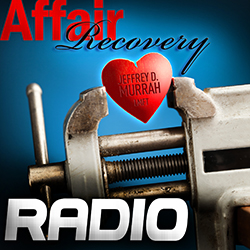Recognizing Anger <<– listen to the audio here
Hi there. This is Jeff Murrah with Affair Recovery Radio. I am glad you’re here with me today.
For today’s session we’re going to be dealing with recognizing anger. I know in some of the previous sessions we have dealt with things like lies, and much like lies one of the things that you find associated with affairs is anger.
Anger typically goes with it, with affairs, like peanut butter goes with jelly. Anger is a problem for many different reasons. We’re going to be talking about that some today.
First off, anger is not necessarily a bad thing. In most cases anger is a naturally occurring response, even nice people get angry. The difficulty you run into is that when you’re dealing with affairs you’re dealing with something that is very personal. And it hits you on a very personal level. When you’ve been hurt at that type of level it is very natural to find yourself experiencing some anger.
And likewise, the cheater, when they have been exposed, many cheaters do not take very kindly to it. They have a lot of anger in response to what has happened. In some cases they’re embarrassed, in some cases they’re ashamed, in some cases they’re aggravated because how dare you find out or how dare you say something about this.
But you’re going to find anger. Relatives will be angry. There’s going to be a lot of people, a lot of angry people, around you. And you’re going to have to deal with it.
It may seem to be a strange topic to bring up, how do you recognize it, but this is important. Because many times you can find yourself surrounded by anger and not realize that anger is really what you’re dealing with. That’s why I want to go ahead and spend some time talking about recognizing anger.
Because it can be standing there, staring you in the face, and you don’t realize it because either one, you’ve gotten so used to it, or two you’re one of those people that try to be nice and assume that you don’t have anger when in reality there may be more anger there than you realize.
In terms of dealing with it, the solution I’m using an anagram of HLL.
The first part of that is H, and that involves honesty about the anger. You’ve got to be honest about the anger. In your own case you may find yourself saying well, I’m upset, or I’m hurt, I’m disappointed.
Come on. Get with it! These are nothing more than weasel words. You’re using them as cover words to hide your anger. The cheater may be saying this as well. I’m upset, I’m concerned. Anger is anger.
To get past the anger both of you have go to be honest about what you’re dealing with. If you keep dancing around the issue, well he’s upset or she’s upset or I’m upset or I’m disappointed, you’re not going to make it very far. You’re not going to move past the affair very easily. Have the honesty to call the anger what it is. Anger is anger. No matter how many pink ribbons you tie on it, or how much perfume you cover it with, or aftershave, cologne, anger is still anger.
Second thing, and this is an L. Let go of what you cannot control.
Many times when people get angry they are trying to control something that is outside of their control. There is definitely a connection between control and anger issues. You’re going to find yourself, especially with an affair, there are many many things that will start happening in your life, or that are happening in your life, that are outside of your control. You’ve got a choice of either letting go of the control, or getting angry about it.
You can’t control them. You can’t control people’s reactions. You can’t control their feelings. You can’t control most of that. As you realize that you can’t control it you’re going to have to let go of the anger.
It’s almost like, I mentioned the connection between control and anger, you’re going to have to unhook it. Much like the cars of a train can be unhooked, you’re going to have to unhook that desire to control, from the anger, so that when you’re faced with a situation that’s outside of your control you don’t go into a rage to try to control the person, or tell them off, or force them to somehow to do something. Because you’re not going to be able to, first of all. And the anger is not going to help.
The third part of recognizing anger is another L, and that is listen to your body. Your body knows when you’re angry. Whether or not you do, your body does. And by listening to your body it is going to give you signals, much like the flashing lights on the dashboard of your automobile. It is going to signal you concerning the status of what’s going on.
Things like increased heart rate, faster breathing, your stomach going into knots, your blood pressure going up, having skin irritations. There are many psychosomatic signs that you need to be aware of that will let you know that you’re angry.
Although with your mind you might say well I’m not angry, I’m just hurt, I’m just upset, well your body knows whether or not you’re angry. And you need to listen to your body.
I know in my case, when I’m angry, my upper lip tends to quiver. As a therapist, a lot of times, we can have more denial than a lot of other folks. But I know when my upper lip starts quivering I’m angry. I’ve had to accept that.
With different ones of you you’re going to have to identify what system reacts. I know with some people it’s the heart rate. With some people their hands actually start, their fists start balling up. You may find yourself tensing up in your neck or tensing up in your shoulder when you’re angry. In terms of discovering what unique psychosomatic signs that you experience, that’s going to be part of your homework to find out how to know when you’re angry. Because many people don’t realize when you’re angry.
It’s easier to see when your spouse is angry. You may see the angry face, the flaring nostrils of their nose, or their eye getting a certain light, but not be able to see it in yourself. It’s going to be important in terms of dealing with the anger that you recognize it not only in your spouse, but also in yourself. Because you can only deal with what you’re aware of.
Much like in terms of dealing with lies you can only deal with the lies once you’re aware of them. Likewise with the anger. You’re only going to be able to deal with it once you’re aware of it.
These are some things that will help you start dealing with your anger today. Getting honest with yourself about your anger, let go of what you can’t control, and to listen to your body.
Until next time, this is Jeff Murrah with Affair Recovery Radio. Thank you.

















2 Responses
I am a 57 year old man that really needed to find a website like yours. I have read so much and search so much for 2 and a half years in order to to begin to understand what the hell happen in my marriage. I’m so thankful to our Lord that He put you in my sight. I don’t know who you are, all I will say, is that you have so much outstanding vision that its incredible and I thank God for your existence and all your help. Thank You. From the bottom of my Shredded Heart.
Marco,
Thank the Lord that you found the site. I am glad that you found it helpful. I was touched by your comment. It often strains the heart to be searching for answers over a long period of time. I am sure that you grew weary during that time. If you have any further questions or topics you want me to address, feel free to write to me. I am glad that you found us.
Jeff